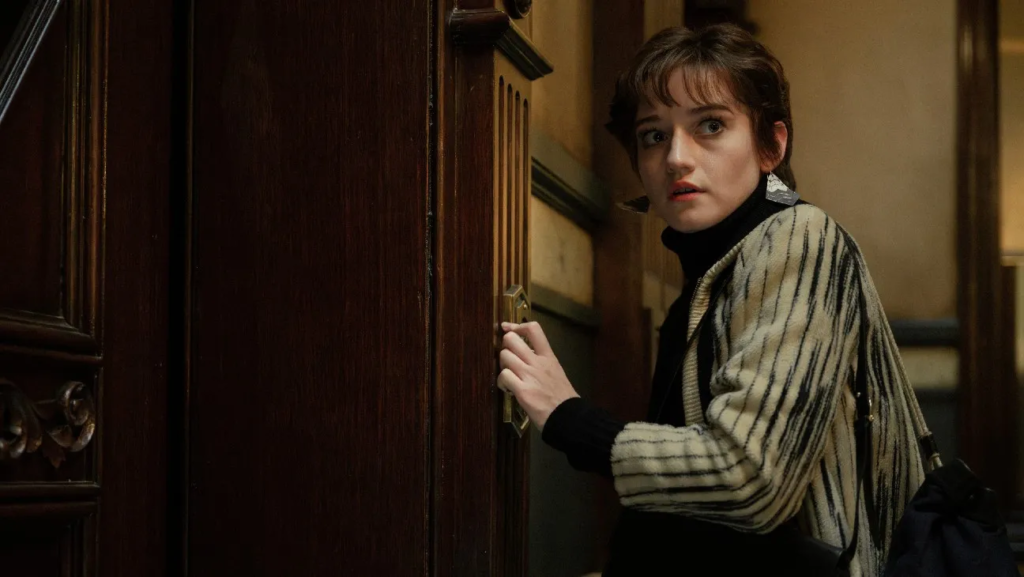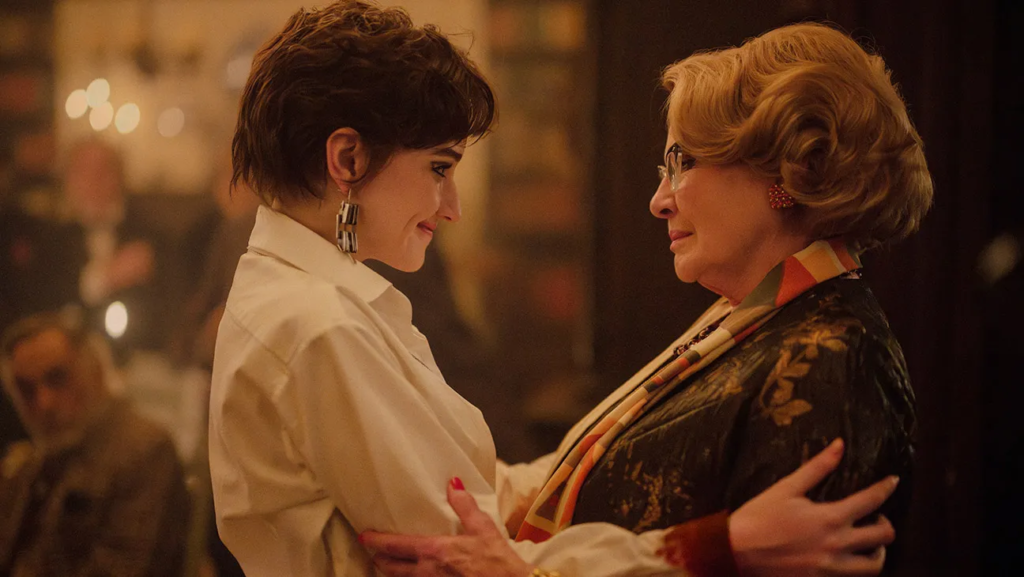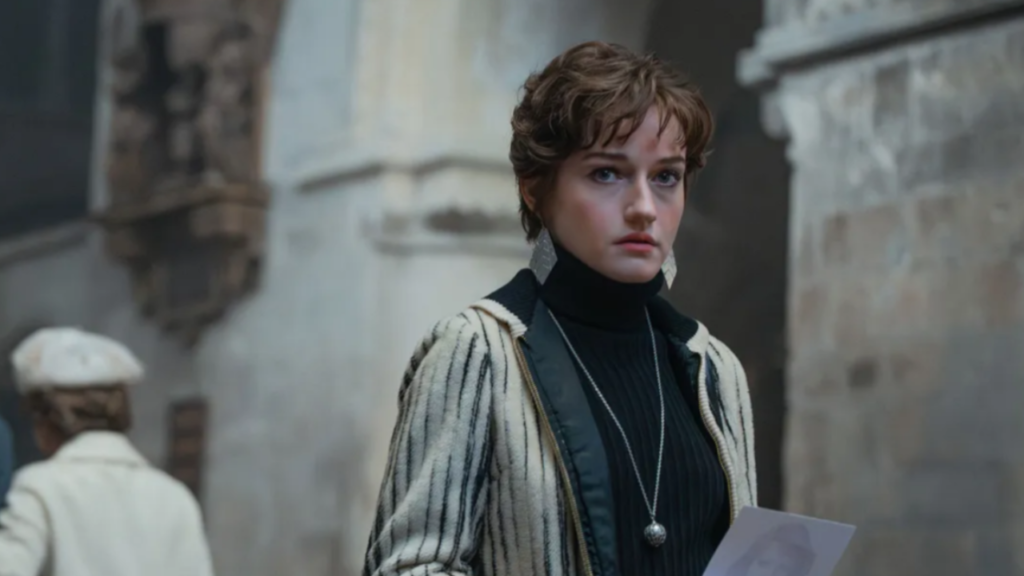Director: Natalie Erika James
Writers: Natalie Erika James, Christian White, Skylar James
Stars: Julia Garner, Dianne Weist, Jim Sturgess
Synopsis: A struggling dancer finds herself drawn into dark forces by a peculiar couple promising her fame.
“It’s the role of a lifetime.”
In 1968’s Rosemary’s Baby, Rosemary Woodhouse (Mia Farrow) has a brief conversation with a young woman named Terry (Victoria Vetri) in the laundry of the Bramford building. It’s a brief exchange. Terry discusses how lucky she is to be there – picked off the sidewalk by Roman and Minnie Castevet (Sidney Blackmer and Ruth Gordon) after falling on hard times and addiction. According to Terry they are “the best people in the world, bar none,” and she “would be dead now if it wasn’t for them… or in jail.” Terry is wearing a three-hundred-year-old necklace, one that Rosemary will later be gifted. The next time the audience sees Terry she is a body on the pavement.

Natalie Erika James’ Apartment 7A imagines Terry Gionoffrio (Julia Garner) as a complete character, one in a line of many young women who preceded Rosemary as a potential mother for the antichrist. Terry herself is one in a line of many young women in New York City looking for her big break on Broadway. A talented dancer, she’s striving to have her name in lights, but her career is curtailed after a bone crunching fall during a performance of “Kiss Me Kate.” From a soaring chaîné to an operating theatre to a painkiller addiction – Terry limps her way through multiple unsuccessful auditions with only her best friend Annie Leung (Marli Siu) keeping a gentle and supportive watchful eye over her.
Terry auditions for a role in “The Pale Hook” where the director Leo Watts (Andrew Buchan) is told that she is, infamously, “The girl who fell.” Terry explains that it was a mistake that will never happen again, and Watts asks her what the step was that caused the injury. She tells him and he makes her repeat it until her injury is on full display. She tells him, and famous producer Alan Marchland (Jim Sturgess) that she will do the chaîné all day, if necessary, as there is nothing she won’t do to get back on the stage. Marchland having extracted that her background is in slaughterhouse farming in Hazard, Nebraska tells her to get on the ground and act like a pig. Terry tells him her limit is humiliation and refuses.
Defeated and in extreme pain after the audition, Terry takes three painkillers and ices her foot. Annie suggests that “Being on stage isn’t worth this,” – “Oh, Annie, of course it is,” Terry replies. She came to New York to follow her dream, and nothing will get in her way. She makes the decision to follow Marchland to his home, the looming German Renaissance style Bramford building. Extremely disoriented from the large pill dose, Terry ends up vomiting and near passed out on the sidewalk, where, as was established in Rosemary’s Baby, she is picked up by Roman and Minnie Castevet (Kevin McNally and Dianne Wiest).
Terry awakens the next morning in Apartment 7A, the home of the Castevets. They’re kindly, although Minnie is on the eccentric side, and inform her that they can tell she needs help – as they are rich and childless and can tell Terry has a special spark, they’d like to offer her an adjoining apartment rent free. “It’s not the fall that matters, it’s what you do afterwards that counts” says Minnie. They like getting young women back on their feet, the girl that was there before her was escaping an abusive relationship and now she’s moved on. Also, they heard that she’d like to meet up with Alan Marchland which is bound to happen because “all the neighbors are very friendly.” Terry is a touch sceptical at the too good to be true offer, but she’s been mooching off Annie for four months and the Bramford is on the Upper West Side. An agreement is made with the ‘cost’ to be worked out later.

Terry is somewhere between a shrewd operator and hopelessly naïve. When she is packing her few belongings, she tells Annie who is concerned about her moving in with strangers that she’s willing to “play the damsel in distress” for a huge apartment and it’s time for her to get herself together. Just as Annie wouldn’t return to London, Terry isn’t going to return to Nebraska (for deeper reasons than giving up stardom).
The Bramford is luxurious accommodation for Terry but stuck in time. There is something oppressive about it. There are no sounds from the street but the building moans as if it is a living organism. Her dreams are disturbed, and she feels observed. Minnie and Roman walk in and out of her apartment, always with a pleasant excuse, but Terry is aware she will have to draw boundaries. She finds the dance shoe of the previous tenant, Joan Cubuski, and Minnie’s story changes from the one she originally told as she throws it in the trash. Minnie asks her if she is free for drinks at 9pm – this time it won’t be in apartment 7A.
Alan Marchand’s apartment is the only spark of modernity she’s seen in the building. He’s fascinated by the “girl who fell” becoming the “girl who lives downstairs.” “I didn’t pick you for such a fighter,” he says. Between drinks and discussions of “The Pale Hook” written by Adrian Marcado – and the first ‘musical’ produced in American (a riff on “The Black Hook” which was indeed an early musical about a devil-like creature) Marchand flirts and wants to know what fuels Terry’s passion for dance. Dance, she explains, is how she dealt with the death of her mother and the mental demise of her father, her escape: “All I had to do was move my body in a certain way and everything bad would go away. It’s the only time I feel in control.” Marchand proposes a toast to “Body and soul,” and Terry, reeling and drugged, experiences her “Rosemary on the boat” dream.
Apartment 7A comes to life in every dance scene – the choreographed rape of Terry to “(You Gotta Have) Heart” with its male Busby Berkeley styled geometrics and sequined Satan is mesmerizing and horrifying. Minnie and Roman sit as observers on an upper stage at a kitchen table while Marchand strips her to her showgirl sequins and waltzes her into blackness where she is the star of a hideous routine strapped to a mattress.
When she awakens in the morning, naked in Marchand’s bed, she remembers nothing. He laughs that she really can’t hold her drinks and maybe he should be offended. As she begins to protest, he cuts her off telling her it was a one-off thing, and she should get herself cleaned up as she’s in the chorus.
Rehearsals are a mixture of joy and shame for Terry. She’s reunited with Annie, and she’s back on track to working – but she’s still lagging with her injury which causes the lead, Vera (Rosy McEwen) to viciously snarl, “You’re the girl who fell. If you’re going to sleep your way into the show at least have the talent to back it up.” Annie tells Terry to ignore it, but it’s hard to ignore the bruises and deep scratches on her inner thighs. There is nothing she is willing to say. When she finds out she is pregnant she must make an active choice, although Minnie doesn’t see that Terry has a choice – after all that has been done for her, and all that will be done for her, providing a child for the Castevets is both gratitude and a guarantee of fame.

Terry is a fundamentally different character to Rosemary. Where Rosemary was aching for stable domesticity and motherhood, Terry rejects motherhood itself as something horrifying. Terry Gionoffrio isn’t above a small hustle to get her name on the marquee, but her body is her currency as a dancer. Mrs. Lily Gardenia’s (Tina Gray) ointment cured her foot and made it possible for her to dance properly again, and that’s what she has been doing. Pregnancy – no matter how supported by her “new family” – is anathema to her ambition.
The dark secrets of the Bramford reveal themselves through distorted visions and arcane discoveries. Mrs. Gardenia attacks her trying to put an end to things before falling into a coma. Terry’s body is wracked with pain and the shadows pulling at her in nightmares are waking visions. Her terror is partly rooted in how much she is responsible for what is happening, and what has happened, to her. James’ script written in conjunction with Christian White and Skylar James uses the genre of psychological and supernatural horror to reflect how victims of rape and abuse struggle with defining if they are to blame for what they went through.
Apartment 7A is an incredibly slick production. The choreography by Ashley Wallen and Lukas McFarlane is stunning showing the grit and precision of the dancers. The production design and cinematography by Simon Bowles and Arnau Valls Colomer bring to life the 1965 of Rosemary’s Baby without skipping a beat. The Bramford with its never-ending uncanny spaces make it seem like it has spread poisonous roots throughout Manhattan.
The standout performance by Julia Garner cannot be underestimated. To make Terry Gionoffrio a Broadway hopeful, Garner had to learn how to dance and sing (it is all her own work). More than that, Garner needed to embody someone for whom ambition is dangerous and is both a source of strength and vulnerability. Dianne Wiest’s Minnie is less Ruth Gordon’s gaudy and vulgar nosy parker, and more outright antagonist. The interactions between Garner and Wiest are loaded with unspoken tension. Minnie is sweet when she notes Terry’s gratitude, or when the young woman treats her like a surrogate mother – but that sweetness can turn on a dime especially when Minnie’s jealousy surrounding Terry’s youth comes to the foreground.
Natalie Erika James is a strong director, and she brings something distinct to Apartment 7A which distinguishes it as more than a too-late-down-the-line prequel to a masterpiece. Terry’s point of view is larger than her woman in peril situation. It encompasses how easily replaced young women are. She glances fleetingly at a beautiful young hopeful getting off a bus in Manhattan with her suitcases. Is she going to be the star if Terry isn’t? The photograph of her predecessor Joan (possibly a photograph of Victoria Vetri) reinforces to Terry how easily a young woman can be disposed of, and no one notices. 1965 saw the burgeoning of the women’s movement and a sexual frankness in America – but misogyny remained king.
Apartment 7A is a good tension filled and claustrophobic horror film, but it is also an excellent piece of work on bodily autonomy and how the ambitious and driven woman was deemed aberrant and easily corruptible. While not equalling the 1968 film nor Natalie Erika James’ extraordinary debut feature Relic, Apartment 7A proves the devil is not the only evil women need to fear.





